For today’s young workers, the surest path to a good job and satisfying career runs through college. A recent survey by the Pew Research Center finds that college graduates outpace those with less education on virtually every measure of job satisfaction and career success.
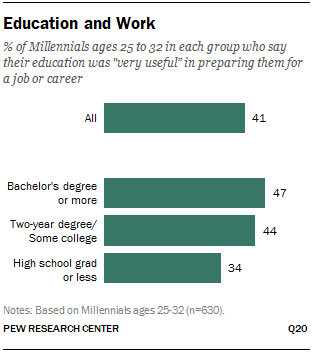 While most workers say their education has been at least somewhat helpful on the job, fully 47% of college graduates13 ages 25 to 32 report that their schooling has been “very useful” in getting them ready for a job or career.
While most workers say their education has been at least somewhat helpful on the job, fully 47% of college graduates13 ages 25 to 32 report that their schooling has been “very useful” in getting them ready for a job or career.
In contrast, only about a third (34%) of young adults with a high school education or less say their education has been as helpful to them, the survey found.
When it comes to their current jobs, about half (53%) of all employed college graduates in their mid-20s and early 30s say they are “very satisfied” at work. In contrast, only 37% of comparably aged Millennials with a high school diploma or less are as satisfied with their job, according to the Pew Research survey.
Employed college graduates ages 25 to 32 also are more likely than those with only a high school diploma or less to say they are in a career or career-track job (86% vs. 57%) and less likely to say their current job is just something “to get [them] by” (14% vs. 42%).
When they look ahead, about six-in-ten (63%) Millennial college graduates in their late 20s and early 30s are confident that they have enough training and education to get ahead in their current job or career. In contrast, about four-in-ten (41%) of comparably aged high school graduates feel they have enough education to advance on the job.
Even though the current Millennials ages 25 to 32 are better educated than the generations of young adults who preceded them,14 the survey found only one significant generational difference in the overall perceived value of their education in preparing them for a job and career—some 41% of Millennials ages 25 to 32, 45% of Gen Xers and 47% of Baby Boomers say their schooling was “very useful” in getting them ready to enter the labor force. A somewhat larger share of Silents than Millennials say their education prepared them very well (50% vs. 41%).
The Value of a College Degree
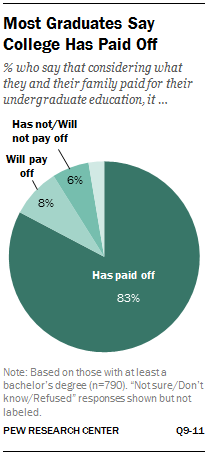 Turning to college graduates, the survey finds that, regardless of their generation, adults with college degrees recognize the benefit of their undergraduate education.
Turning to college graduates, the survey finds that, regardless of their generation, adults with college degrees recognize the benefit of their undergraduate education.
About nine-in-ten adults with a bachelor’s degree or more education (91%) say that considering what they and their family paid for their undergraduate education, it has paid off for them or they expect it will pay off in the future. The sentiment is shared by an even higher proportion (96%) of those with a graduate or professional diploma.
About seven-in-ten college graduates (69%) also say their undergraduate or graduate major is at least somewhat related to their current work. And few express serious regrets about their choice of college major: Only 29% say that selecting a different field of study would have better prepared them to get the kind of job they wanted.
But these views vary significantly by major, the survey found. A third (33%) of all liberal arts, social science and education majors say they should have selected another field of study to better prepare them for their ideal job. In contrast, only about a quarter (24%) of science and engineering majors express a similar regret.
As a group, those with a graduate or professional degree are the most likely to say their education was “very useful” in preparing them for the working world (69% vs. 47% for all respondents).
These highly educated adults also are more likely to be very satisfied with their current job (66% vs. 52% for all) or to say they have sufficient education and training to advance in their job or career (84% vs. 59%).
Turning to demographics, Millennial college graduates are significantly less likely than older generations to currently have a job “very closely” related to their major (36% for Millennials vs. 54% for older adults).15
Many alumni look back on their college days fondly—but also with regrets. When it comes to better preparing themselves for the labor force, half of all college graduates say gaining more work experience while they were undergraduates would have helped their chances to get the job they wanted. Men (55%) are more likely than women (45%) to say this. About four-in-ten (38%) say that studying harder also would have improved their employment prospects—a view shared by some 47% of men but only 31% of women college graduates. As a generation, Millennials have struggled to find work during and in the aftermath of the Great Recession16—one likely reason that they are more likely than older adults to say more work experience in college (65% vs. 45% for older graduates) and looking for work sooner (43% vs. 26%) would have enhanced their job prospects.
The remainder of this chapter explores of these findings in greater detail. The first section examines how those with different levels of education assess the value of their schooling in preparing them for a job and career. The next section examines whether college graduates believe their degrees were worth the money they or their families spent to send them to college. The final section explores the value of individual college degrees in the job market as well as reports what college graduates say they should have done while in school to better ready themselves for the working world.
Education and Work
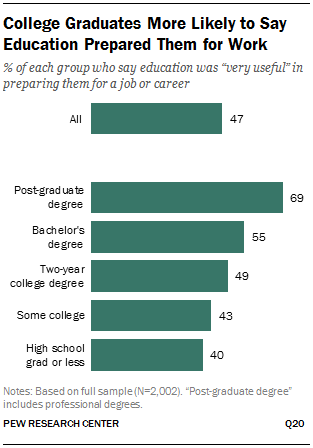 The Pew Research Center survey confirms what generations of parents have told their children: To get a good job, get a good education. At the same time, the findings suggest that the definition of a good education has changed in recent decades, with the rewards of education disproportionately concentrated among better educated adults while those with less education are lagging far behind.
The Pew Research Center survey confirms what generations of parents have told their children: To get a good job, get a good education. At the same time, the findings suggest that the definition of a good education has changed in recent decades, with the rewards of education disproportionately concentrated among better educated adults while those with less education are lagging far behind.
Overall about eight-in-ten adults say their education has been “very useful” (47%) or “somewhat useful” (34%) in preparing them for a job or career. Only 16% find that their education has done little or nothing to prepare them for work, the survey found.
But just beneath the overall numbers lies this striking pattern: As educational attainment increases, so do favorable judgments about the usefulness of their education in getting them ready for the labor force. In fact, these positive views rise in virtual stair-step fashion as education levels rise.
According to the survey, about seven-in-ten adults with a graduate or professional degree say their education was very useful preparing them for work, about 15 percentage points higher than those who had completed a bachelor’s degree (69% vs. 55%).
The increase is nearly as large as you move up from the lower rungs of the education ladder. Some 40% of those with a high school education or less find their education very useful on the job, a proportion that increases to 49% among those with a two-year college degree.
Millennial Women More Likely than Men to See Education Useful
With one notable exception, few demographic differences exist on this question. Nearly half of all whites (45%), blacks (48%) and Hispanics (48%) say their education was “very useful” in preparing them for a job or career. Similar shares of Millennials (46%), Gen Xers (45%) and Baby Boomers (47%) agree.
At the same time, Millennial women are more likely than either Millennial men or older men to say their education was “very useful.” Among Millennials, only about four-in-ten men (39%) but 53% of women have found their education to be very beneficial in preparing them for the workforce. About half of older women (49%) and nearly as many non-Millennial men (45%) share this view.
Career and College
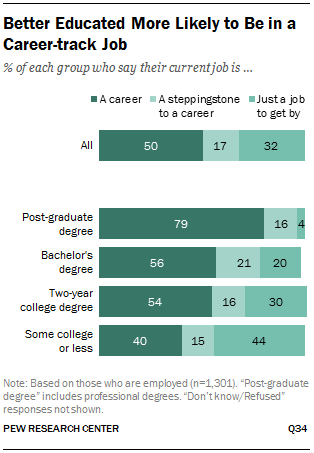 College is the most direct route to a good job and career. The higher their level of education, the more likely an individual is to say that his or her current job is a career or a steppingstone toward a career, a relationship that also crosses generational boundaries.
College is the most direct route to a good job and career. The higher their level of education, the more likely an individual is to say that his or her current job is a career or a steppingstone toward a career, a relationship that also crosses generational boundaries.
About two-thirds of all employed adults say their current job is their career (50%) or a steppingstone on the path to a career (17%). For the remaining 32%, their work is “just a job to get [them] by.”
But this profile shifts dramatically by levels of education. About eight-in-ten (79%) of those with graduate or professional degrees say their current job is their career. Some 56% of those with bachelor’s degrees and about an equal share (54%) of those with two-year college degrees also say they currently have a career-level position.
In contrast, only four-in-ten adults who have not graduated from college report that their current job is their career, and 15% say they are on the path to a career. The remaining 44% say their current job is just something to get them by, roughly ten times the proportion of those with a graduate degree who offer the same view.
Other Demographic Differences
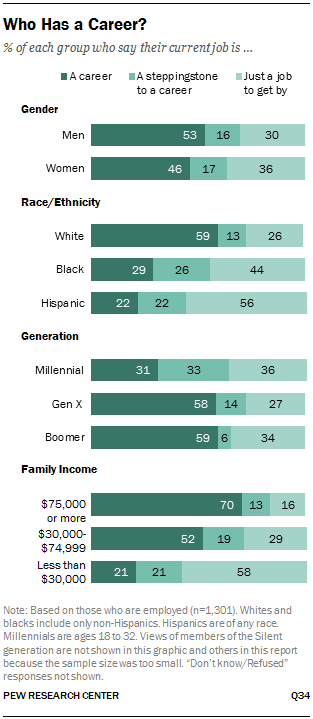 The education divide is not the only significant demographic difference separating those with a career and those who are not yet there. In fact, it’s not even the largest.
The education divide is not the only significant demographic difference separating those with a career and those who are not yet there. In fact, it’s not even the largest.
Large differences emerge when the focus shifts to race and ethnicity. Non-Hispanic whites (59%) are about twice as likely as blacks (29%) or Hispanics (22%) to say their current job is their career.
At the same time, Hispanics are about twice as likely as whites to say they their current job is just something to get them by (56% vs. 26%), a disparity that in part reflects educational differences between Hispanics and whites. For much the same reason, blacks also are significantly more likely than whites to be off the career path (44% vs. 26%).
More predictably, Gen Xers (58%) and Baby Boomers (59%) are significantly more likely to say they are in a career than Millennials (31%), who are just beginning their working lives. But a third of Millennials say they have their foot in the door: They are about twice as likely as Gen Xers (33% vs. 14%) and roughly five times as likely as Boomers (33% vs. 6%) to say their current job is a steppingstone to a career.
But when it comes to non-career jobs, similar shares of Millennials (36%) and Boomers (34%) say their current job is just something “to get me by.”
Labor economists know that income, education and employment type are closely associated. Better-educated individuals are more likely to occupy better paying jobs, which largely explains why survey respondents with annual family incomes of $100,000 or more are more than twice as likely as those making less than $50,000 to say they are in career jobs (77% vs. 31%).
At the same time, about half (49%) of those with family incomes below $50,000 say their work is just a job to get them by, a view held by only 10% of highest-earning adults.
Back to School
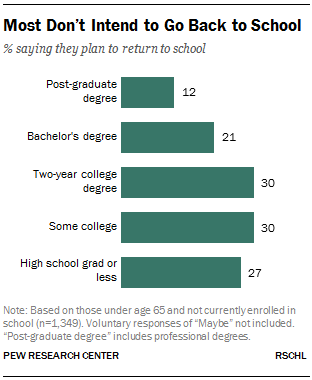 The value of education on the job is clearly seen when adults younger than 65 and not in school are asked if they ever plan to resume their education. A quarter say they intend to return to school someday, and an additional 11% say they might.
The value of education on the job is clearly seen when adults younger than 65 and not in school are asked if they ever plan to resume their education. A quarter say they intend to return to school someday, and an additional 11% say they might.
According to the survey, those who have not obtained a bachelor’s degree are more likely than those who have at least a bachelor’s degree to have plans to return to school (28% vs. 18%). Yet even people who have a four-year degree under their belt are considering going back to school, with fully 21% of bachelor’s degree holders and 12% of post-graduate degree holders saying they will resume their education.
Social science, liberal arts and education majors are more likely than business majors to say they will return to school or “maybe” will go back (40% vs 23%). Some 28% of science and engineering majors say they are definitely or maybe planning to return to school.
The survey also found that blacks and Hispanics are twice as likely to say they plan to go back to school as whites. About four-in-ten (43% of blacks and 41% of Hispanics) say this, compared with 18% of whites—a relationship that holds up even accounting for different levels of education.
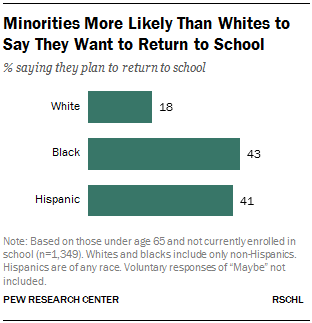 For example, 42% of blacks with less than a bachelor’s degree and 41% of Hispanics with the same level of education intend to return to school, compared with 21% of whites with comparable education.
For example, 42% of blacks with less than a bachelor’s degree and 41% of Hispanics with the same level of education intend to return to school, compared with 21% of whites with comparable education.
As might be expected, plans to return to school diminish with age. About half (54%) of 18- to 29-year-olds intend to return to school. This share falls to 28% among 30- to 49-year-olds and only 10% among 50- to 64-year-olds. The question was not asked of respondents ages 65 and older.
Household income also is modestly correlated with the intent to go back to school. People in families making less than $50,000 per year are the most likely to have plans to return (33% say they will). By contrast, 18% of those in families making between $50,000 and $99,999, and 14% of those making $100,000 or more say they plan to go back to school.
As might be expected, those who think they need more training or education to succeed in their career are more likely to plan to go back to school. About four-in-ten (41%) of those currently employed who say they need more training to get ahead in their job or career intend to go back to school, compared with only 14% of those who feel they already have the necessary education. A similar share (45%) of those not employed who say they need more training in order to get the kind of job they want intend to return to school, while only 17% who already have the education they need have plans to go back.
Is College Still Worth It?
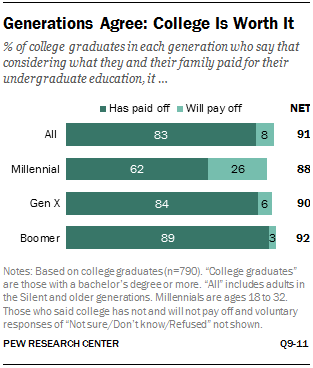 In spite of rising tuition rates at both public and private colleges, most college graduates agree that college has paid off.17 A significant majority (83%) of bachelor’s degree holders believe that they have already seen a return on what they and their family paid for their bachelor’s degree. An additional 8% say that it hasn’t paid off yet, but they believe it will in the future. Only 6% of graduates say that college has not paid off for them and that they do not expect it to in the future.
In spite of rising tuition rates at both public and private colleges, most college graduates agree that college has paid off.17 A significant majority (83%) of bachelor’s degree holders believe that they have already seen a return on what they and their family paid for their bachelor’s degree. An additional 8% say that it hasn’t paid off yet, but they believe it will in the future. Only 6% of graduates say that college has not paid off for them and that they do not expect it to in the future.
The generations agree that getting their college degree was worthwhile. But Gen Xers (84%) and Boomers (89%) are significantly more likely than Millennials (62%) to say they already have seen a payoff. By contrast, for the remainder of those who say their degree has not yet paid off, Millennials are more likely than older generations to think it will eventually be worth it (26% vs. 6% for Gen Xers and 3% for Boomers.)
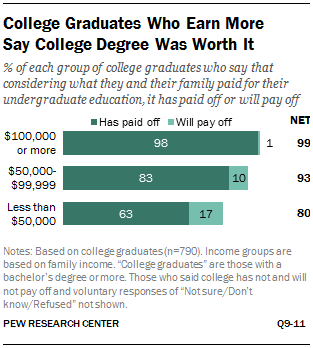 Majorities of college graduates say their education paid off, regardless of their family income. But college graduates with family incomes of at least $50,000 per year are more likely than those earning less to feel that their degrees have already paid off (90% vs. 63%). Those in the top income tier, earning $100,000 or more, are the most likely to say this (98%).
Majorities of college graduates say their education paid off, regardless of their family income. But college graduates with family incomes of at least $50,000 per year are more likely than those earning less to feel that their degrees have already paid off (90% vs. 63%). Those in the top income tier, earning $100,000 or more, are the most likely to say this (98%).
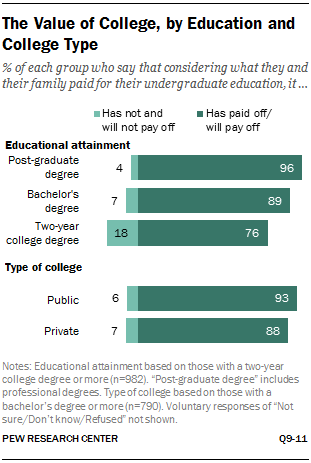 The Pew Research Center poll shows that the higher the degree attained, the more graduates feel their undergraduate education has paid off. Among those with postgraduate degrees, almost all have no regrets (93% say their bachelor’s degree has paid off and 3% believe it will in the future).
The Pew Research Center poll shows that the higher the degree attained, the more graduates feel their undergraduate education has paid off. Among those with postgraduate degrees, almost all have no regrets (93% say their bachelor’s degree has paid off and 3% believe it will in the future).
Slightly fewer of those whose highest educational attainment is a bachelor’s degree are as positive (89% say it’s paid off or think it will), and even fewer—but still a sizable majority—of those with two-year college degrees say the same (76%).
Despite the higher sticker price at most private colleges, graduates from public and private schools express similar satisfaction in value for their money. Some 84% of public college graduates and 81% of private college graduates say that their education has paid off, and an additional 9% of public college graduates and 7% of private college graduates say it will pay off in the future.
Student Loans
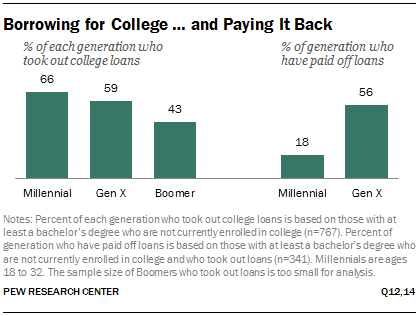 Half of college graduates took out loans to help finance their education. Perhaps reflecting the fact that college tuition has risen sharply over the decades, Millennials (66%) and Gen Xers (59%) are more likely than Boomers (43%) to have taken out loans to pay for their education. Among those who did take out loans, Gen Xers are much more likely (56%) to have finished paying them back than Millennials (18%). The sample size of Boomers who took out loans is too small for analysis.
Half of college graduates took out loans to help finance their education. Perhaps reflecting the fact that college tuition has risen sharply over the decades, Millennials (66%) and Gen Xers (59%) are more likely than Boomers (43%) to have taken out loans to pay for their education. Among those who did take out loans, Gen Xers are much more likely (56%) to have finished paying them back than Millennials (18%). The sample size of Boomers who took out loans is too small for analysis.
College graduates at all income levels are about equally likely to have taken out loans. But those earning more are significantly more likely to have finished paying off their student debt, in part because they are older and have had more time to pay off their loans. About two-thirds (68%) of college graduates who took out loans and who have a family income of at least $75,000 have paid off their loans, compared with 42% of college graduates making less than $75,000.
Those who have completed at least a bachelor’s degree are the most likely to have taken out loans, compared with those who have a degree from a two-year college (50% vs. 37%).
College graduates who did not take out loans are more likely than those who did borrow money to say that their degree has paid off (91% of non-borrowers say this, compared with 79% of those who took out loans). Conversely, those who took out loans to help pay for college are more likely to say that their education will pay off in the future (10% vs. 3%). And those who borrowed less money are more likely to say that their education has already paid off (87% of those who took out less than $20,000 in loans say this, compared with 68% of those who took out more). The biggest contrast is among graduates who have paid off their loans compared with those who have not. Fully nine-in-ten (93%) of those who have already repaid all the money they borrowed say that their degree has paid off, compared with only 59% of those who are still in the process of paying them off.
Job Preparation
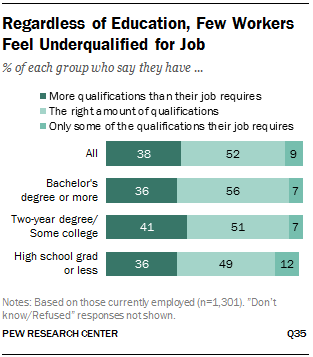 Regardless of level of education, about half (52%) of people who are currently employed feel they have the right qualifications for the job. Most of the remainder (38%) feel overqualified for their current job, and only a few (9%) think they are underqualified.
Regardless of level of education, about half (52%) of people who are currently employed feel they have the right qualifications for the job. Most of the remainder (38%) feel overqualified for their current job, and only a few (9%) think they are underqualified.
But these views vary by demographic characteristics. For example, blacks are more likely (53%) than either Hispanics (39%) or whites (36%) to feel that they have more qualifications than their job requires. And Millennials are more likely than older generations to say the same (46% of Millennials, compared with 34% of older adults).
People in the upper half of the income scale feel more content with their qualifications than those in the lower half. More than half of those making at least $50,000 say they have about the right amount of qualifications for their job (61%), compared with 43% of those who make less than $50,000. Those making less than $50,000 are more likely to say they are overqualified than those making at least $50,000 (45% vs. 33%).
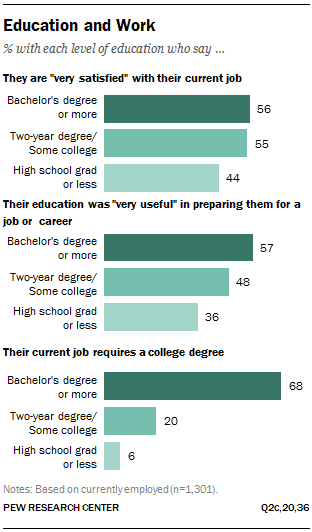 College degrees or at least some experience at college may help with other measures of job satisfaction. Those with at least some college experience are more likely to report being “very satisfied” in their current job than those with a high school diploma or less.
College degrees or at least some experience at college may help with other measures of job satisfaction. Those with at least some college experience are more likely to report being “very satisfied” in their current job than those with a high school diploma or less.
Those with a degree from a four-year college are more likely than those with less education to say their education was “very useful” in preparing them for a job or career. About six-in-ten (57%) bachelor’s and graduate degree holders say this, compared with 48% of those who completed a two-year degree or went to college but did not graduate and 36% of those with a high school diploma or less.
As might be expected, college graduates are much more likely to be in a job requiring a college degree—yet a notable number of those without diplomas also say they hold a job that requires a college degree. About two-thirds (68%) of those who have at least a bachelor’s degree say their job requires a college degree. Roughly one-third (31%) of two-year college graduates say the same. Yet fully 14% of those who say they attended some college but did not graduate and 6% of those who have a high school diploma or less say they work in a job that requires a college degree.
The Value of a College Major
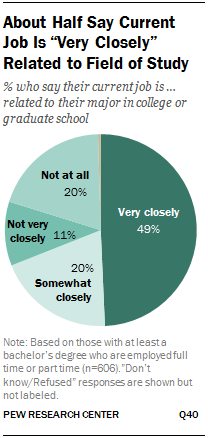 About seven-in-ten college graduates (69%) say their undergraduate or graduate field of study is at least somewhat related to their current work and only 29% say they should have selected a different undergraduate field of study to prepare them for their ideal job, according to the Pew Research survey.
About seven-in-ten college graduates (69%) say their undergraduate or graduate field of study is at least somewhat related to their current work and only 29% say they should have selected a different undergraduate field of study to prepare them for their ideal job, according to the Pew Research survey.
But these views vary significantly by field of study and how far an individual went in school. By most measures tested in this survey, science and engineering majors are more likely than respondents with degrees in liberal arts, social science or education to say their education is a better fit with their current job and career goals. At the same time, those with graduate or professional degrees are more likely than other college graduates to say their job is closely related to their studies.
For example, only about a quarter (24%) of science and engineering majors say they should have selected another major to better prepare them for their ideal job. In contrast, a third (33%) of all liberal arts, social sciences and education majors express a similar view.
In a similar vein, social science, liberal arts and education majors are significantly more likely than science and engineering graduates to say they are overqualified for their job (42% vs. 28%).
Most Say Job Is Related to Major
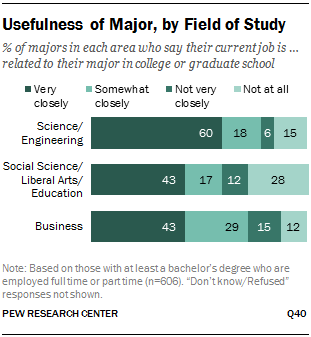 The survey found that about seven-in-ten college graduates say their work is “very closely” (49%) or “somewhat closely” (20%) tied to their undergraduate or graduate degree.
The survey found that about seven-in-ten college graduates say their work is “very closely” (49%) or “somewhat closely” (20%) tied to their undergraduate or graduate degree.
Science and engineering majors and, to a lesser extent, those who majored in business are more likely than those who majored in the liberal arts, social science or education to say their current job is closely related to their college majors.
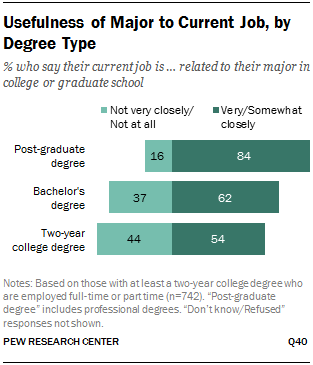 Overall about eight-in-ten science and engineering majors (78%) say they have a job related to their field of study, including 60% who say it is “very closely” linked to their major. A similar share of business majors say that their job is related to their field of study (73%), but a smaller share of business majors than science and engineering majors say it is “very closely” related (43% vs. 60%). Only 59% of social science, liberal arts or education majors say their job is related to their degree, with 43% saying it is very closely related.
Overall about eight-in-ten science and engineering majors (78%) say they have a job related to their field of study, including 60% who say it is “very closely” linked to their major. A similar share of business majors say that their job is related to their field of study (73%), but a smaller share of business majors than science and engineering majors say it is “very closely” related (43% vs. 60%). Only 59% of social science, liberal arts or education majors say their job is related to their degree, with 43% saying it is very closely related.
Millennials and their Majors
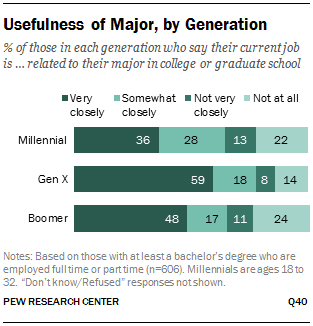 Compared with other generations, a larger share of Millennials are college graduates. At the same time, these young college graduates are significantly less likely than older graduates to say their current job is closely related to their field of study, in part because so many of these recent college graduates fill entry-level positions.
Compared with other generations, a larger share of Millennials are college graduates. At the same time, these young college graduates are significantly less likely than older graduates to say their current job is closely related to their field of study, in part because so many of these recent college graduates fill entry-level positions.
According to the survey, 36% of Millennials say their job is very closely related to their major. In contrast, about six-in-ten Gen Xers (59%) and 48% of Baby Boomers say they have a job that is very closely aligned with their major field of study.
At the same time, Millennials are more likely than Gen Xers or Baby Boomers to say their current job is somewhat closely related to their undergraduate or graduate majors (28% for Millennials vs. 18% for Gen Xers and 17% for Boomers). Altogether, the share of Millennials saying their job is “very” or “somewhat” related to their major is 64%, smaller than the share among Gen Xers (77%) but similar to the share of Boomers who say the same (65%).
Roughly a third of Millennials (35%) say their current job is either “not very closely” or “not at all” related to their majors. That’s the same as the overall share of Boomers (35%) but larger than the share of Gen Xers (22%) who express the same view.
Other Demographic Differences
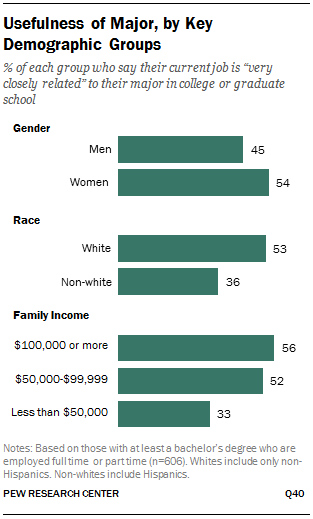 Non-Hispanic whites and individuals with a graduate degree are more likely than minorities or those with a bachelor’s or two-year degree to say their major is very closely related to their current job.
Non-Hispanic whites and individuals with a graduate degree are more likely than minorities or those with a bachelor’s or two-year degree to say their major is very closely related to their current job.
According to the survey, about half 53% of all non-Hispanic whites report their major and their job are very closely related, but just 36% of blacks, Hispanics and other minorities say this. (The sizes of the black and Hispanics samples were too small to analyze separately.)
Respondents with a graduate or professional degree (68%) are more likely to say their current job matches very well with their degree than those with a bachelor’s degree (40%) or a two-year degree (37%).
At the same time, some 56% of those with family incomes of $100,000 or more say their current job is very closely connected to their major, compared with 33% of those earning less than $50,000.
Second Thoughts about their Major
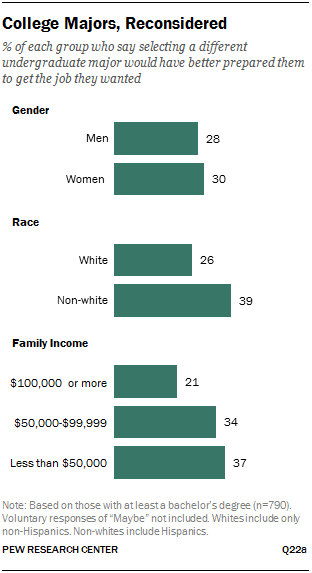 Roughly three-in-ten college graduates (29%) say that selecting a different field of study as undergraduate students would have better prepared themselves for their ideal job.
Roughly three-in-ten college graduates (29%) say that selecting a different field of study as undergraduate students would have better prepared themselves for their ideal job.
In terms of preparing them for their desired job, liberal arts, social science and education majors are significantly more likely than those who majored in science and engineering to have second thoughts about their undergraduate field of study (33% vs. 24%).
Minority college graduates in particular say a different major would have better prepared them for the type of job they wanted. According to the survey, about four-in-ten non-whites (39%) say they would have enhanced their chances of getting a job they wanted if they had chosen a different major, compared with 26% of whites.
Similarly, those with family incomes of less than $50,000 are much more likely than those earning $100,000 or more to express some degree of regret with their majors (37% vs. 21%).
Looking Back
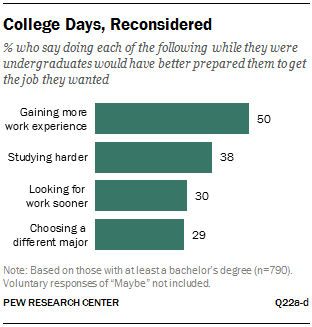 In addition to selecting a different major, the Pew Research Center survey asked college graduates whether they could have better prepared for a job they wanted while still in school by gaining more work experience, studying harder or beginning their job search earlier.
In addition to selecting a different major, the Pew Research Center survey asked college graduates whether they could have better prepared for a job they wanted while still in school by gaining more work experience, studying harder or beginning their job search earlier.
About three-quarters of all college graduates (74%) say taking at least one of those four steps would have enhanced their chances to land their ideal job.
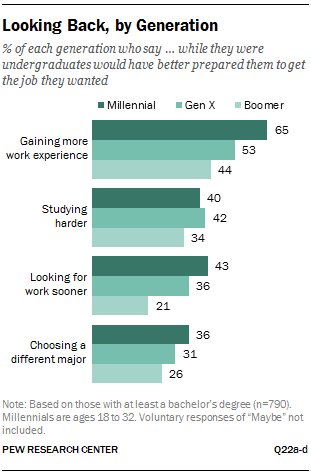 Leading the should-have-done list: getting more work experience while still in school. Half say taking this step would have put them in a better position to get the kind of job they wanted. Roughly four-in-ten (38%) regret not studying harder, while three-in-ten say they should have started looking for work sooner (30%) or picked a different major (29%).
Leading the should-have-done list: getting more work experience while still in school. Half say taking this step would have put them in a better position to get the kind of job they wanted. Roughly four-in-ten (38%) regret not studying harder, while three-in-ten say they should have started looking for work sooner (30%) or picked a different major (29%).
Taken together, the survey suggests that, among these items tested, only about a quarter (26%) of all college graduates have no regrets, while 21% say they should have done at least three or all four things to enhance their chances for their desired job.
Millennials See More Missed Opportunities
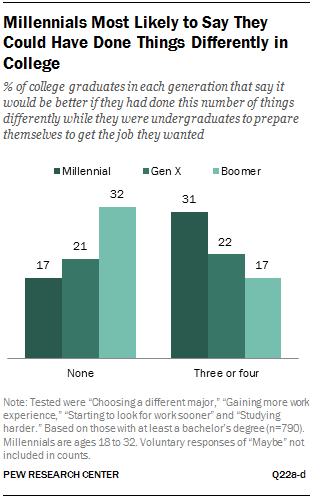 Millennials are significantly more likely than Baby Boomers to express regrets on three of the four items tested and to express multiple regrets about their college experience, the survey found. (The sample of those in the Silent generation was too small to analyze.)
Millennials are significantly more likely than Baby Boomers to express regrets on three of the four items tested and to express multiple regrets about their college experience, the survey found. (The sample of those in the Silent generation was too small to analyze.)
About two-thirds of all Millennials (65%) but 53% of Gen Xers and 44% of Baby Boomers say they should have gotten more work experience while in college. Millennials also are more likely than Boomers to say they would have improved their employment prospects if they had looked for work sooner (43% vs. 21% for Boomers). About a third (36%) of Gen Xers said this.
When it comes to majors, Millennials (36%) are more likely than Boomers (26%) to say their job prospects would have been enhanced if they had chosen another field of undergraduate study.
There were no significant differences among the generations in terms of those who say they should have studied harder.
Overall, Millennials are more likely to have multiple regrets about their college experience. Only 17% of Millennials say none of the four steps would have prepared them to get the job they wanted, while larger shares of Baby Boomers (32%) had no regrets. About two-in-ten Gen Xers (21%) say they have no regrets about their educational experience.
In contrast, three-in-ten (31%) of all Millennials but 17% of Boomers say they should have done three or all four things differently in order to prepare themselves for the job they wanted. Some 22% of Gen Xers say it would have been better if they did three or four things differently when they were undergraduates.
The Major Disconnect
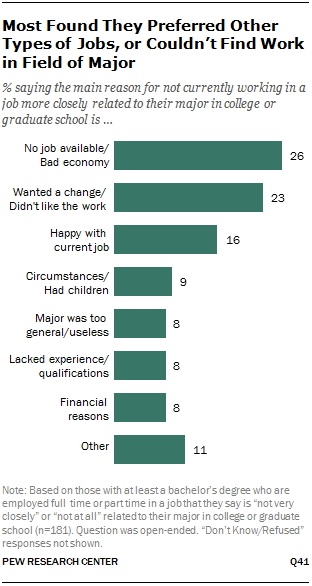 When college graduates who say their job is “not very closely related” or “not at all related” to their field of study in college or graduate school were asked why, no single reason dominated. About a quarter (26%) blame the bad economy or say they were unable to find work in their field. A similar share wanted a change or found that the work wasn’t for them (23%), while 16% say they are happy with their current job.
When college graduates who say their job is “not very closely related” or “not at all related” to their field of study in college or graduate school were asked why, no single reason dominated. About a quarter (26%) blame the bad economy or say they were unable to find work in their field. A similar share wanted a change or found that the work wasn’t for them (23%), while 16% say they are happy with their current job.
For others, life got in the way. About one-in-ten say they had children or other life circumstances interfered (9%), and 8% say their major was too general or it was useless, they lacked the experience or qualifications to find work in their field, or they chose a non-related job for financial reasons.


